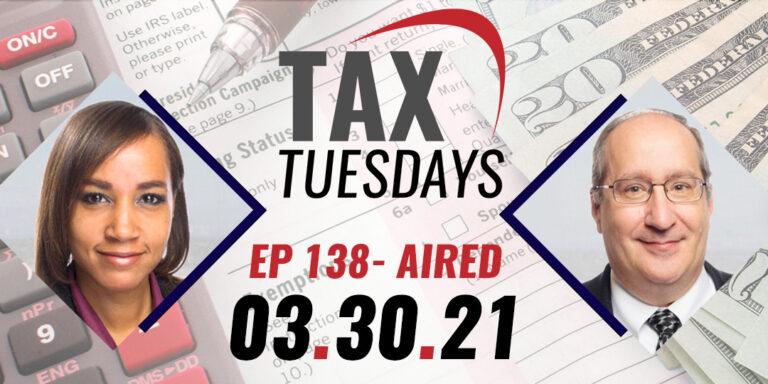In this episode of Toni Talks, Toni Covey, EA, is joined by special guests Aaron Soffer, Esq., and Jeff Webb, CPA, to talk about the advantages and disadvantages of C corporations versus S corporations, including the tax implications of each.
Updated September 22, 2020
One question I receive frequently in my day-to-day involves the differences between C corporations and S corporations. So, let’s talk about the major differences and advantages and disadvantages of each.
Liability Protection
In terms of asset protection, there is no major difference between C and S corporations. Both entities get the same protections under state law. The distinction between C corporations and S corporations really comes down to taxation.
C vs. S Corporations: Tax Rates
A C corporation is its own entity. It is a separate and distinct taxpayer from its owner(s) and operators. An S corporation is a flow-through entity, which means that an S corporation’s profits or losses flow down to the owner’s tax return. Thus, C and S corporations have different tax rates. Thanks to the Tax Cuts and Jobs Act, C corporations pay a flat 21% tax (what was previously 35%). As flow-through entities, S corporations pay taxes at the rate of their individual owner(s).
Corporation Formation
Every corporation starts the same way, regardless of whether it’s a traditional C corporation, an S corporation, or an LLC taxed as either. First, you file the corporation with the Secretary of State in the state wherein you plan to do business. After that, to be treated as an S corporation, the owner(s) must make a special election with the IRS. “S” status does not happen automatically. To be treated as an S corporation instead of a C corporation for tax purposes, you must file Form 2553 with the IRS.
C vs. S Corporations: Startup Expenses
To determine whether a C or S corporation is right for you, there are some important considerations to keep in mind. C corporations can take some deductions that S corporations cannot. One significant deduction available to C corporations but not S corporations is education as a startup expense.
Granted, continuing education is deductible for individuals on their personal Form 1040s; however, “continuing education” has certain parameters. The most significant parameter for so many of our clients is that “continuing education” cannot involve a new field or area of study than your current occupation. If you try to deduct education as a startup expense when you’re starting a new line of business, you’ll run into trouble with it showing up on your personal tax return (as it would with an S corporation).
C corporations, however, are allowed to have a workforce in place. This means that C corporations are allowed to train their workforce with whatever education is necessary to succeed before opening their doors. Therefore, C corporations are allowed to deduct education as a startup expense. With a flow-through entity like an S corporation, you can’t otherwise deduct education for learning something new.
C vs. S Corporations: Tax Planning
Both C and S corporations are excellent tax planning tools. If you do have education as a startup expense, one possibility is to start out as a C corporation, then later make the “S” election to change to an S corporation (after capturing your education as a startup expense of the C corporation). You need to be careful with this strategy, however, because you don’t want to have a couple of years of losses inside a C corporation, then switch to an S corporation because those losses will get trapped in the C corporation. When it comes to successful tax planning, it’s key to reevaluate every year to consider the best moves for your business’s unique facts and circumstances.
Furthermore, because C corporations are separate taxpayers, they are a useful tool for income splitting, possibly one of the most powerful tax planning tools. If your personal tax rate is high, C corporations are useful for removing income from your personal tax return and instead moving it to the corporation. For instance, if you’re a high-income W-2 earner (such as doctors, architects, etc.), you may not want all of your income to hit your personal tax return. If you make $600,000 a year in W-2 income, those dollars are being taxed at a much higher rate than the corporate flat tax of 21% — and that’s just at the federal level. When you factor in state taxes, which vary greatly and can be quite high in some states (like California), you could be paying as much as 50% in taxes. In this case, a C corporation could be useful for splitting that income.
C vs. S Corporations: Profits
Many accountants warn of the dreaded “double taxation” that faces C corporations if the corporation distributes profits as dividends. What this “double taxation” issue means is that the C corporation pays a flat 21% tax on its profits; then, if it distributes dividends to shareholders, shareholders will pay tax again at their individual tax rates.
Ultimately, this “double taxation” concern isn’t as much of an issue as some make it out to be. The solution is simple: do not take money out of the C corporation as a dividend distribution if your income will put you above the 0% tax bracket. Instead, take the money out of the C corporation as a salary. Then, the salary is deductible to the C corporation.
It can be easier to get money out of an S corporation. With an S corporation, though, you may be required to pay yourself a reasonable salary. In general, if you’re not profitable, you don’t want to pay yourself a salary. However, there are a lot of different factors to take into account here. For example, if you are a real estate investor looking to make yourself more attractive and fundable to lenders, you will want to take a salary to show W-2 income.
C vs. S Corporations: Tax Implications
C corporations are offered more tax deductions than any other entity. The Tax Cuts and Jobs Act made this even more true. For C corporations, there are a lot of options for reducing taxable income.
Some tax deductions available only to C corporations include education startup expenses (as we’ve already discussed), accountable plans, and medical reimbursements. For medical reimbursements, S corporations can’t do this; however, they can deduct health insurance premiums.
Additionally, there are a few situations in which you would not want to use a C corporation. For example, there is a personal holding company tax that applies when more than 60% of a C corporation’s income comes from investments (interest, dividends, rents, royalties, etc.). You don’t want a significant amount of this type of income in your C corporation.
The Section 1244 stock loss option is another important tax implication that must be considered when choosing between C and S corporations. If you dissolve your C corporation, you can actually take the losses on your personal tax return up to $100,000 for married joint-filers ($50,000 for single filers). However, this option is not available to C corporations with more than 50% of their income classified as “portfolio income” (investment income). If you use an LLC taxed as a C corporation, the Section 1244 stock loss option is not available to you because LLCs do not issue stock.
C vs. S Corporations: The Takeaway
Ultimately, what it all comes down to is this: it depends. Choosing the best entity for you is indelibly linked to your individual facts and circumstances. Your business goals, entity structure, and startup expenses are some important factors that must be taken into account when deciding between a C or S corporation.
There are so many online entity mills more than happy to crank out entity paperwork, but the tax and legal aspects are what make or break the success of a business venture. This is why it’s so crucial to seek professional guidance with your business entities.
Here at Anderson Advisors, all of the professionals are experts in business planning, tax planning, and entity structures. We work to build a comprehensive plan for our clients that takes everything into consideration in one place: tax planning, legal protection, and business planning. If you’re ready to get expert guidance for your business, schedule a complimentary Strategy Session now. You can schedule online or by calling 888.871.8535. On the call, you and an experienced Senior Advisor will go over your individual facts and circumstances to outline the best entity structure for your business goals. There’s no cost and no obligation, just high-quality guidance from advisors you can trust.
Free Strategy Session with an Anderson Advisor
Receive a detailed risk assessment to assist in lowering problem areas that could wipe out all of your assets with one wrong move. Speak with an Anderson Professional Advisor to get your FREE Strategy Session.
Limited-Time Offer: ($750 value.)















